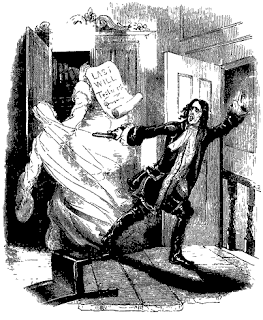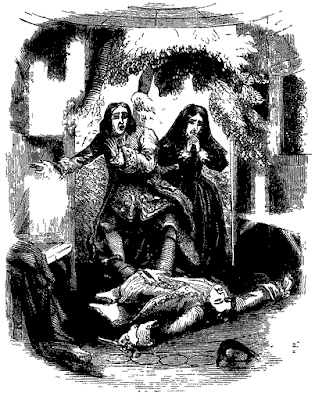Previously: Marchdale is evil, apparently. If you missed it, don't worry; JMR includes a helpful recap at the beginning of Chapter 63 (The Guests at the Inn, and the Story of the Dead Uncle).
After we're reminded what happened in the last chapter, we flash back to the inn Marchdale mentioned earlier, where he heard a man say he was going to the ruins at midnight. The innkeeper has decided that a bunch of townspeople looking to get drunk before and/or after vampire hunting is good for business, which amuses me. So does this:
"It's shocking," said one of the guests; "it's shocking to think of. Only last night, I am quite sure I had such a fright that it added at least ten years to my age."JMR, are you lampshading your tendency towards repetitive and awkwardly expository dialogue, or are you just finding better ways to pad your word count?
"A fright!" said several.
"I believe I speak English -- I said a fright."
One man tells the story of hearing a frightening intruder at midnight. Any suspense is spoiled by the fact that the sound of footsteps coming up the stairs is "Dab, dab, dab." That's right up there with "GRONGGGG!" and "KRR—RR—AAAAAAANG!" in the Glove of Darth Vader series. (That would be the sound of a docking bay door closing and the sound of a submarine leaving the dock, respectively, in case you've blocked those books out of your memory.)
He ends by revealing that it was just the maid knocking something over and waking him, and he was frightened over nothing.
There was a general look of disappointment when this explanation was given, and one said, --Well, I can't argue with that.
"Then it was not the vampire?"
"Certainly not."
"And, after all, only a clock weight."
"That's about it."
"Why didn't you tell us about that at first?"
"Because that would have spoilt the story."
Soon someone pipes up with:
"Well, although our friend's vampyre has turned out, after all, to be nothing but a confounded clock-weight, there's no disputing the fact about Sir Francis Varney being a vampyre, and not a clock-weight."And it suddenly occurs to me that JMR's style of dialogue actually works when he's writing people who are drunk and slightly confused.
Tom Eccles, who doesn't believe the vampire exists, makes a bet that he can go to the ruins at night and leave a handkerchief to prove he was there. He leaves, and the rest of the group launch into a conversation about what to do about illegitimate children, and -- wait, what? But the story told does twist back to the subject of the dead rising from the grave, so I guess it works.
I don't have much bad to say about this chapter. The use of dialogue is effective, and the chapter is built around humorous conversation, which provides a nice breather after the Shocking Revelations. The fact that some guy was coming to the ruins was already established by Marchdale and didn't require a flashback to explain, but if JMR needed to use some tangential ghostly tales to pad things out, this is at least better grounded in the story of Varney the Vampire than his previous efforts were.












